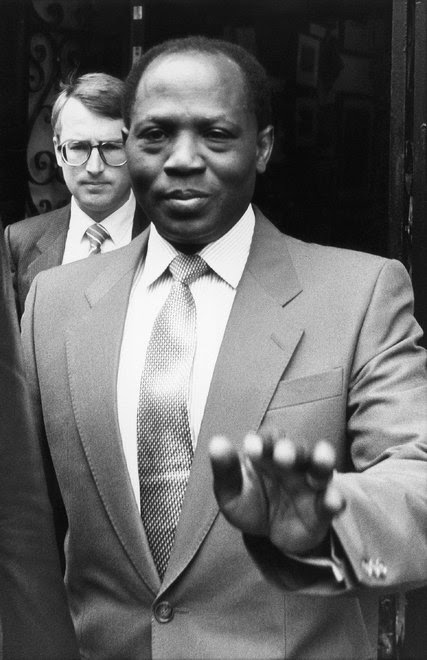In
July 1984, Umaru Dikko, a former Nigerian government official living in
exile after a military coup, was kidnapped outside his London estate,
packed in a shipping crate and driven to Stansted Airport, to be flown
back to Lagos, where he stood accused of embezzlement and other crimes.
The
abduction was witnessed by his secretary, who alerted Scotland Yard.
The plot was foiled by customs officials, who held up the flight, opened
two crates marked “diplomatic baggage” and discovered not only a
drug-stupefied Mr. Dikko, but also three of his kidnappers, who were
shipping themselves to Africa as well.
The episode provoked a diplomatic crisis and a flood of news media attention to what The New York Times, in a front-page article, called a “Nigerian Drama.”
“I
remember the very violent way in which I was grabbed and hurled into a
van, with a huge fellow sitting on my head — and the way in which they
immediately put on me handcuffs and chains on my legs,” Mr. Dikko told
the BBC a year later.
Mr. Dikko, who returned to Nigeria
in the 1990s, died on July 1 in London, where he was said to be
receiving treatment for an undisclosed illness. His death, at either 77
or 78 — biographical sources differ — was confirmed by the Nigerian
Consulate in New York.
Mr.
Dikko was the minister of transport in the civilian government run by
Shehu Shagari, his brother-in-law, from 1979 until the end of 1983, when
the Nigerian Army forcibly expelled the administration and installed Maj. Gen. Muhammadu Buhari as the head of state.
An
outspoken critic of the junta, Mr. Dikko fled the country shortly
afterward, reportedly dressed as a priest, but continued to advocate an
overthrow of the new rulers. The Buhari government accused him of
corruption and of stealing millions of dollars from a rice distribution
program he oversaw, charges he denied.
Seventeen
people were arrested as complicit in the kidnapping. Four men were
eventually convicted of the crime and went to prison. One was a Nigerian
diplomat and former army officer; the others were Israelis, at least
two of whom were alleged to be members of the Mossad, the Israeli
intelligence agency. The third was a physician who applied the
anesthesia and had boxed himself up with Mr. Dikko in order to monitor
him during the flight and keep him from dying.
When
the customs agents opened the crate and found Mr. Dikko, the
anesthetist reportedly said, “Well, gentlemen, what do we do now?”
The
governments of Nigeria and Israel denied involvement in the crime, and
the four defendants, who confessed, claimed they were mercenaries hired
by Nigerian businessmen. But immediately after the abduction, Britain
detained airliners bound for Nigeria and vice versa, and relations
between Britain and Nigeria, its former colony, were seriously chilled.
“The kidnap caused one of the worst-ever diplomatic crises between Britain and Nigeria,” the historian Max Siollun wrote in The Independent of London
in 2012. “The Nigerian high commissioner was declared persona non grata
in London, and the head of Nigeria Airways narrowly escaped being
arrested by British police. Diplomatic relations between Nigeria and
Britain were suspended for two years.”
According
to numerous reports, Mr. Dikko was born in Wamba, in central Nigeria,
in 1936. The Independent reported that he had studied at the University
of London and worked for a time for the BBC. He served as a commissioner
in the northern province of Nigeria now known as Kaduna State and was
the manager of Mr. Shagari’s presidential campaign.
After
his kidnapping, Mr. Dikko went to law school in London and was admitted
to the bar. In Nigeria in the 1990s, he once again became a political
force. In recent years he was chairman of the disciplinary committee of
the People’s Democratic Party, led by President Goodluck Jonathan.
In
a statement, Mr. Jonathan said Mr. Dikko’s “significant contributions,
especially his lifelong advocacy for stronger political parties, greater
discipline within political parties and the supremacy of political
parties, have assured him of a place in the annals of Nigeria’s
political development.”
A
list of Mr. Dikko’s survivors could not be confirmed, but news reports
in England and Africa referred to a son, Dr. Bello Dikko, and a brother,
Lamido Dikko. The Daily Independent of Lagos said Mr. Dikko “left behind two wives, 11 children and many grandchildren.”

No comments:
Post a Comment